Being a volunteer at Ape Action Africa is a different experience for every person who arrives at the sanctuary. It depends on the needs of the sanctuary at the time of your stay and the length of time you volunteer.
The day after I arrived, my partner and I were told we would be needed to help raise three infant chimpanzees – Mac, Mbia and Ayisha. They were approximately 1-1.5 years old. The 24-hour care of infant chimpanzees and gorillas is seldom given to volunteers. Although it can occur, we never came here expecting it to happen.
The months spent with these infants and the other animals at the sanctuary was a moment in my life, where I feel proud, grateful and privileged to have made a positive difference in their lives.
I hope this post allows you to live through some of my experiences and to gain a greater understanding of their plight in the wild and what it takes to be a volunteer.
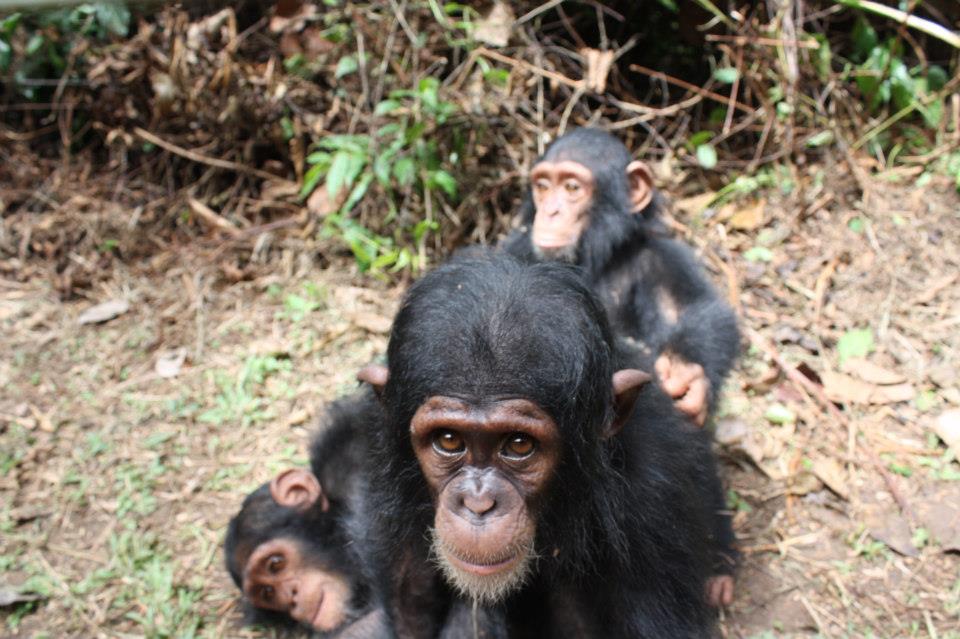
Ayisha (centre) Mac (left) Mbia (behind)
Nursery Chimps
Volunteers usually begin working with the nursery group of chimpanzees, which at the time of our stay consisted of 14 juveniles.
Your responsibilities include assisting their local carer to sweep and remove old food scraps from their day enclosure, prepare their food and milk bottles, clean their sleeping area, provide new browse and observe.
During our stay, we had time to meet all 14 chimps and get familiar with their characteristics. They spent their days in their large, lush enclosure, playing, grooming each other, eating and napping, before being coaxed into their night enclosure with a bottle of milk. The hardest part was recognising who already had a bottle and who still needed one.
These chimps relied mainly on each other for support and companionship rather than the volunteers and their carer. Although, they were always excited to meet new unsuspecting volunteers. Stealing our keys, sunglasses or anything else they could reach if we got too close!
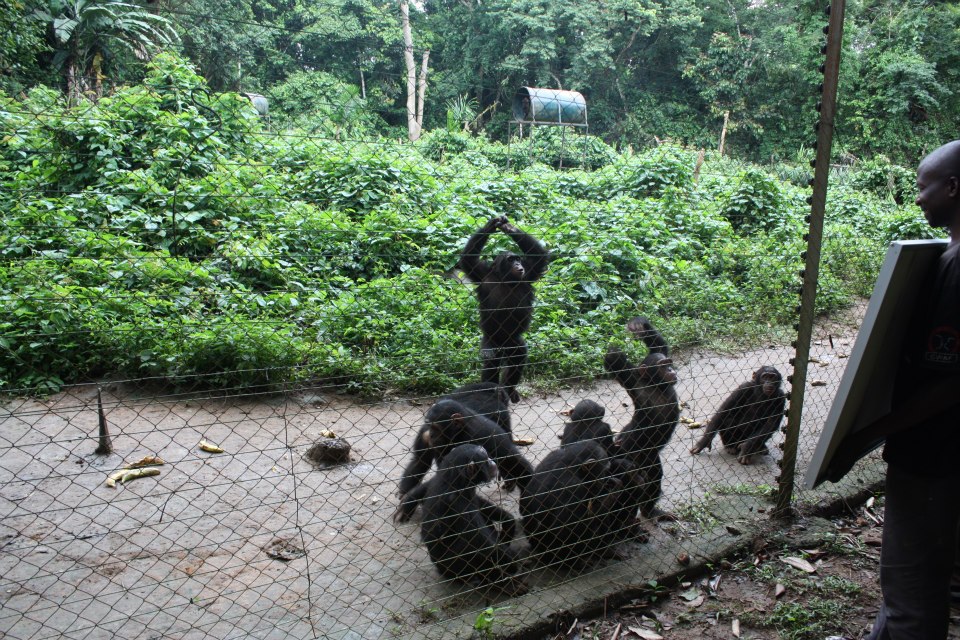
Looking at themselves in a mirror
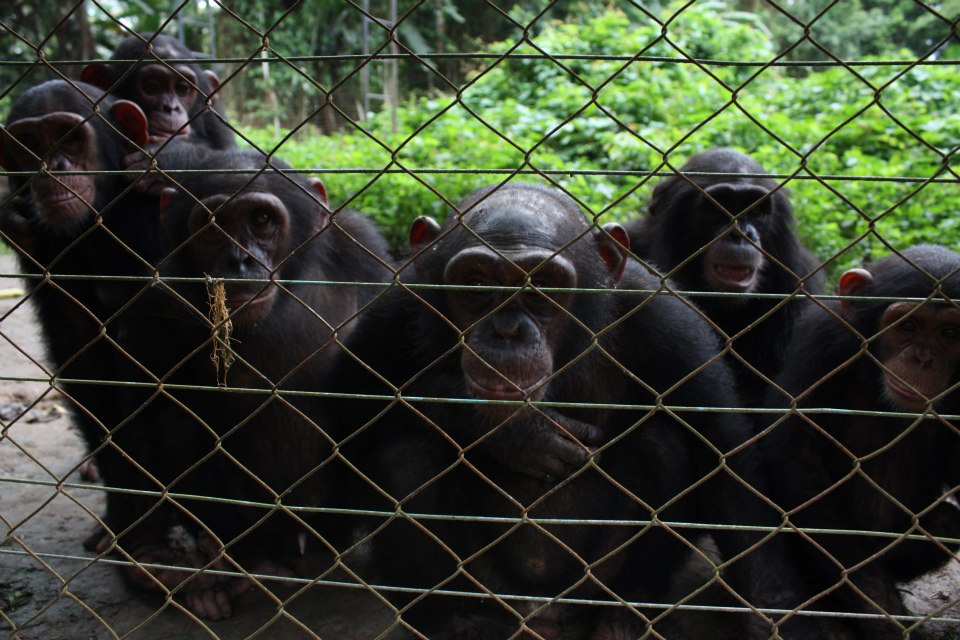
Showing them a picture of themselves
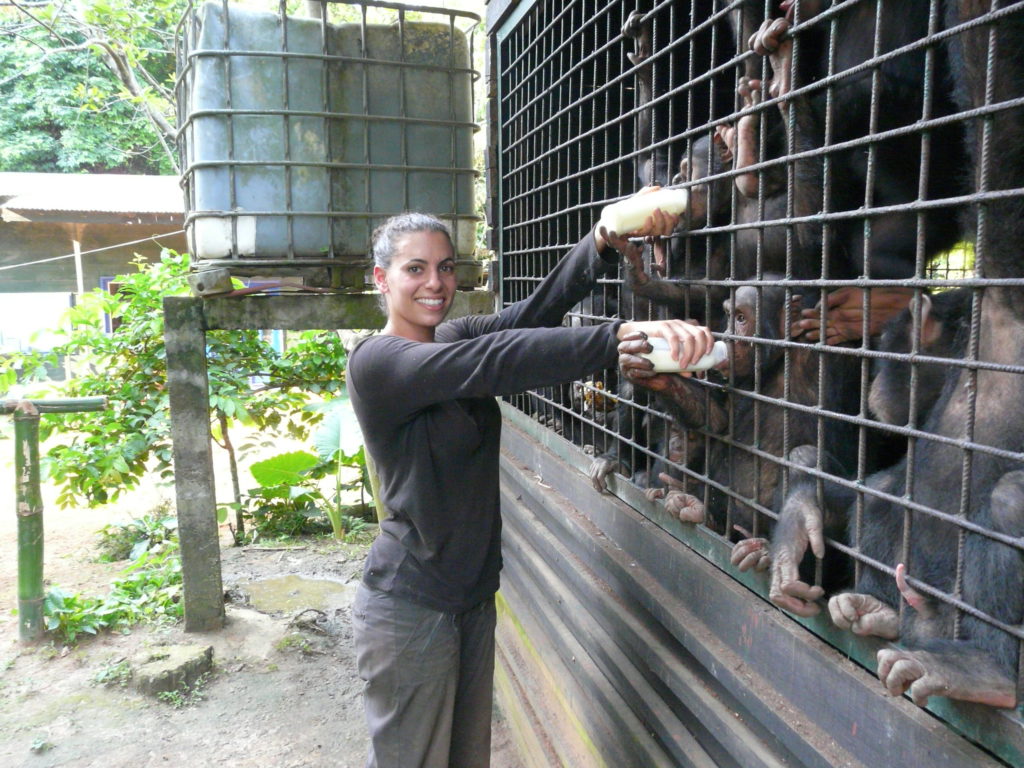
Their evening bottle of milk
Infant daycare
Infants are usually cared for by local staff to ensure the animals receive consistency in their day to day lives and are able to form a trusting bond. In our case, their carer was going on holidays shortly and a replacement carer was needed during this time. She also needed further support when she was working, because taking care of three infant chimpanzees alone is no easy feat! Since we were staying at the sanctuary for 3 months, longer than the other volunteers at the time, we would be able to give the help and support necessary.
We spent our first week in forest daycare with the infant chimps that we would be helping to raise, along with their carer. This enabled us to become accustomed to their daily routine and most of all for the chimps to become acquainted with us.
They were fed a variety of fruits and vegetables, bottle fed milk several times a day and encouraged to groom, play, chase, wrestle, practice climbing, make nests and search for insects. We sat with them in the forest providing enrichment and encouragement, to allow them to grow in confidence.
After daycare, we walked the chimps back to their room, where they continued to play before being fed a bottle of milk and comforted to sleep.
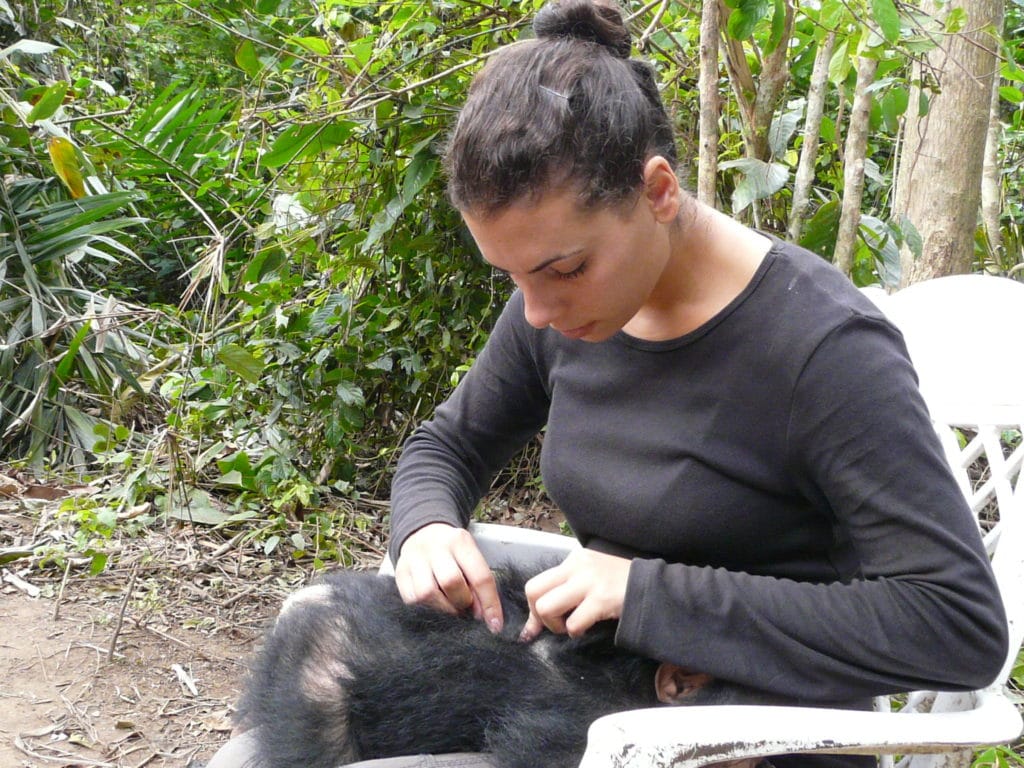
Grooming
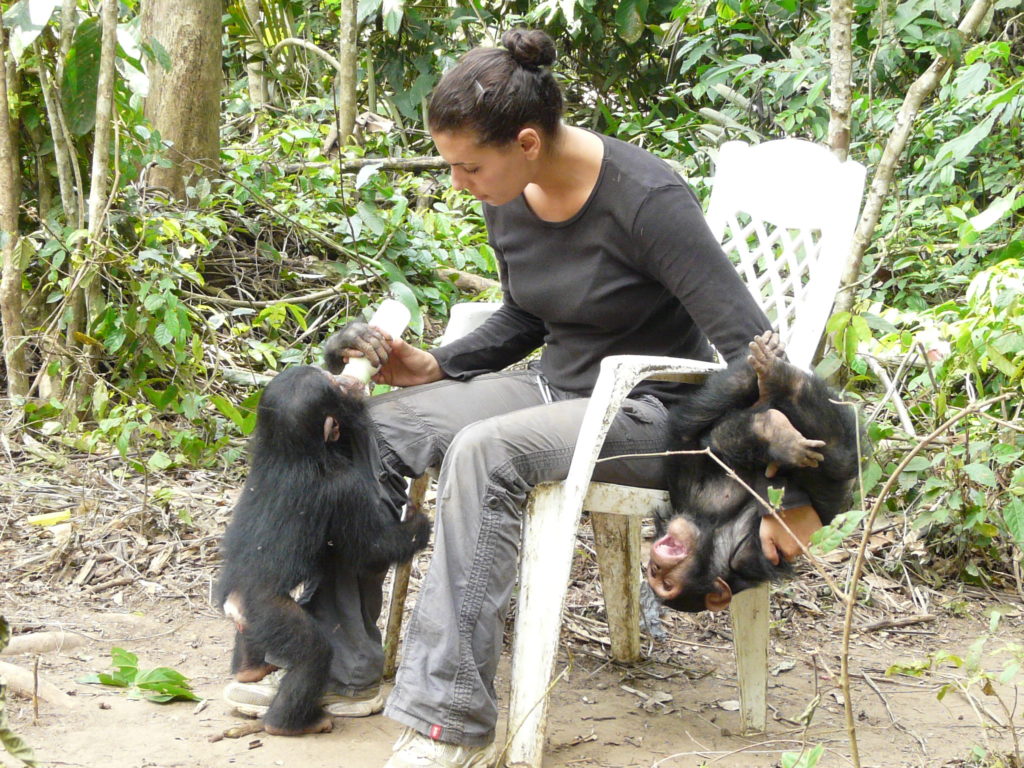
Bottle fed 3x daily
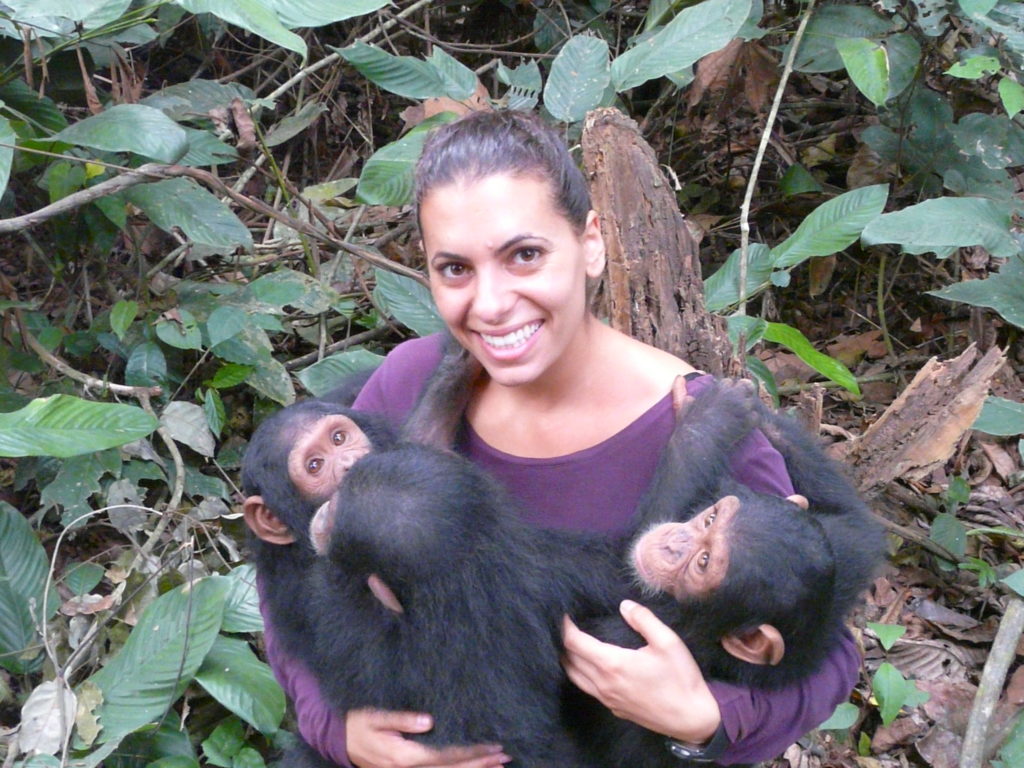
Mac (left) Ayisha (middle) Mbia (right) and I
Ayisha
She was confiscated from a woman trying to sell her as a pet. At just a few months old, she had contracted pneumonia from her human captures. This illness could have been fatal for such a small, vulnerable young baby. By the time she reached AAA, her health was declining. She had long coughing attacks and was weak and exhausted. She managed to get through this tough period and within a few weeks her legs were becoming stronger and her hand-eye coordination improved. But just as Ayisha was gaining confidence and strength a second illness threatened her life. This time she suffered from Meningitis.
The impact on Ayisha’s weak vulnerable body was devastating. She had soaring temperatures, and within a few days, was immobile and blind. The team at AAA worked tirelessly giving medication, support, and care. After some very stressful weeks, she began showing signs of recovery. It took several more weeks for her to recover and enjoy life as a chimpanzee again.
By the time I cared for Ayisha, she was much stronger but still preferred to be carried, and never strayed too far from my side. Over the months, she gained her confidence in climbing trees and found support in her two chimpanzee friends, Mac and Mbia. Often seen being the protector of the group.
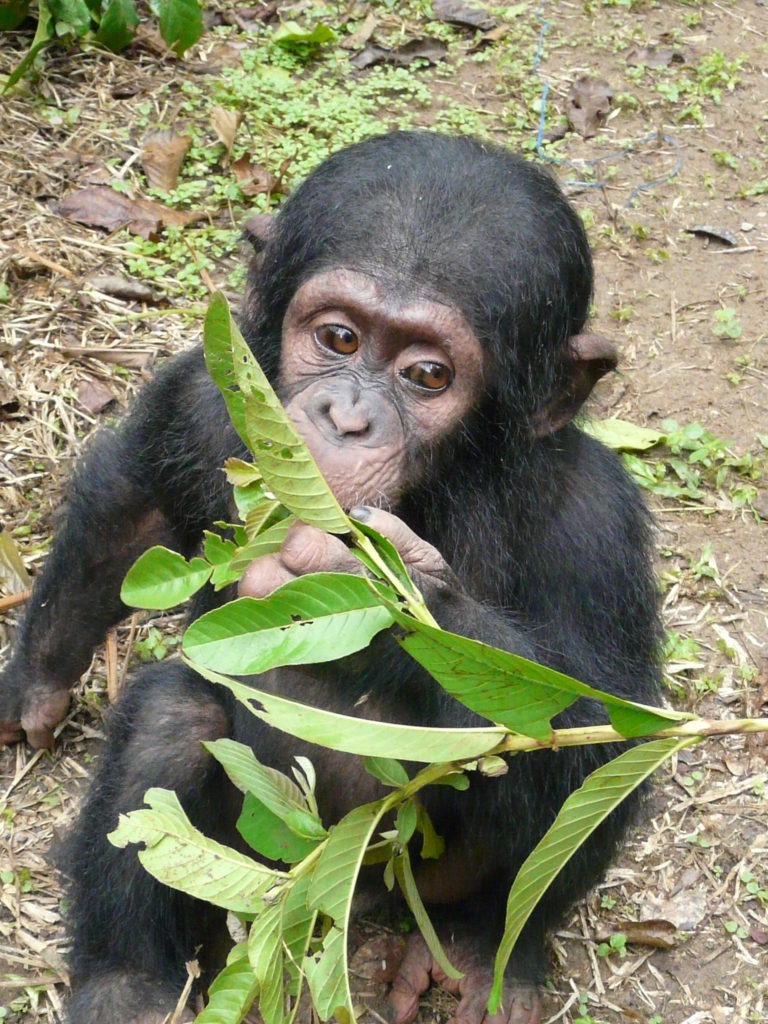
Mbia
She came from neighbouring Equatorial Guinea. AAA was contacted and advised about this little female chimp, who was weak, withdrawn and suffering respiratory problems. A permit to bring her to Cameroon was initiated, but in Africa, papers take time to process.
Luckily an ex-volunteer was in Equatorial Guinea and cared for Mbia until the permit was processed. Mbia was scared and had scars on her waist from being tied with a rope. She refused all human contact and only recognised two types of food – bread and soft drinks. With time and patience, Mbia began to trust and eat more fruits and vegetables. Eventually, she was transported to AAA which took an exhausting 14-hour journey.
When I met Mbia, I noticed she was more reserved and independent than Ayisha and Mac. She preferred to eat alone and watch from a distance, usually up a tree. She did like to be groomed and to play but was more cautious, than the others. As the weeks passed she gained more confidence and trust in me and her chimp friends, running to Ayisha, rather than up a tree if she was frightened.
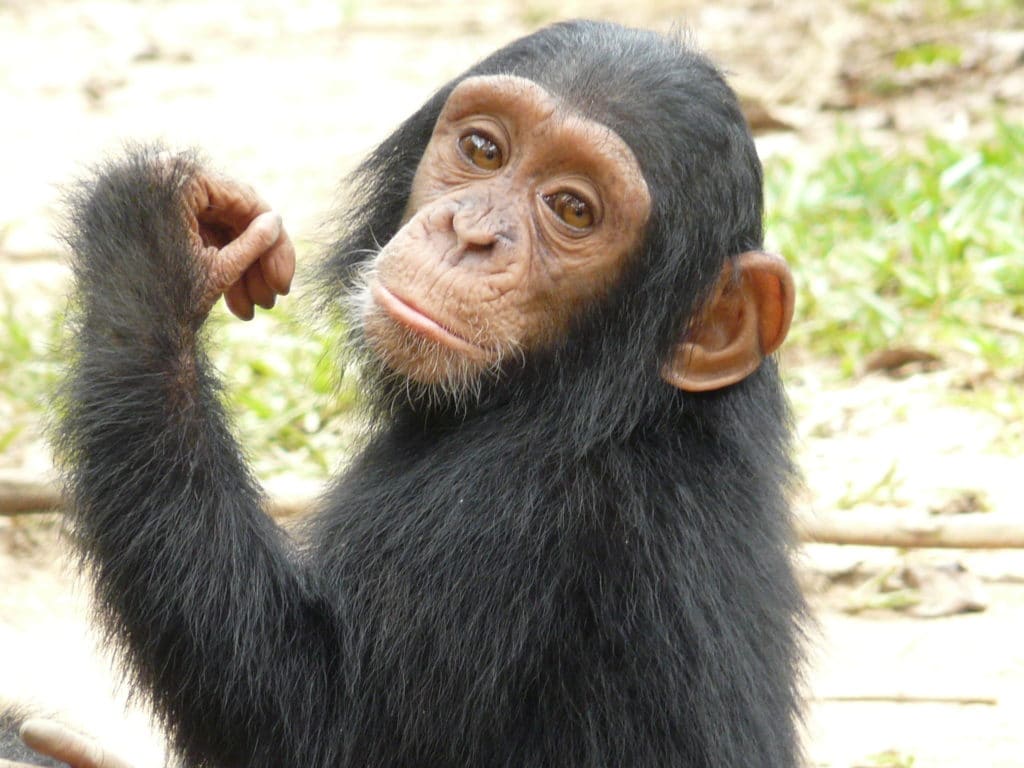
Mac
He was found by authorities when they raided a hunters’ camp. He was likely bound for the pet trade. Mac’s mother was killed by these hunters and butchered for her meat, which was being smoked when he was found. It took over three days for him to arrive at AAA. It was then noticed that he had bullet wounds on his elbow, hand, foot, and chest and a pellet still lodged behind his ear. Which was eventually removed after he gained his strength.
When I got to know him, I noticed how sweet-natured he was, but there was also a lot of sadness in his eyes, from the loss of his family. He loved being touched and groomed and was happiest when eating bananas or pineapples. Making the most satisfying noises and ensuring he got it all over himself for good measure.
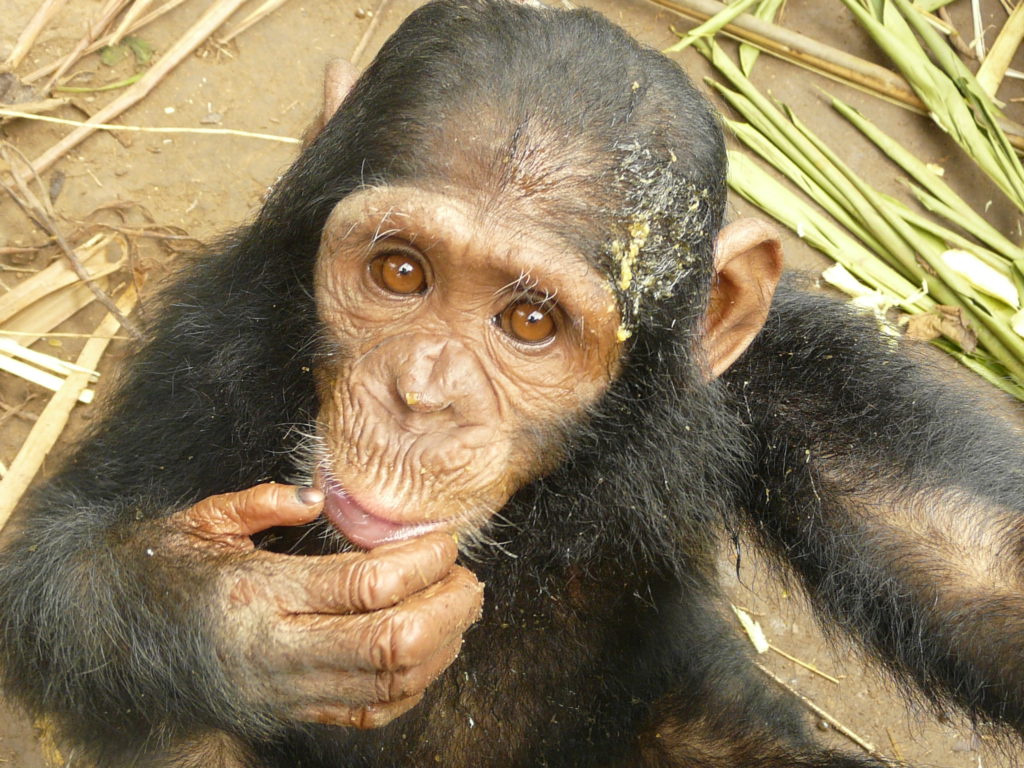
At the time of our stay, AAA had an influx of infant chimps and gorillas. Due to limited space, the two species interacted together during daycare but were separated at night.
Chickaboo and Luci were the two infant gorillas that spent time in daycare with us and their carer. My first day at the sanctuary, I had a surreal unexpected encounter with Chickaboo, you can read about it here. Little did I know that the majority of my three months at the sanctuary would involve raising these beautiful animals.
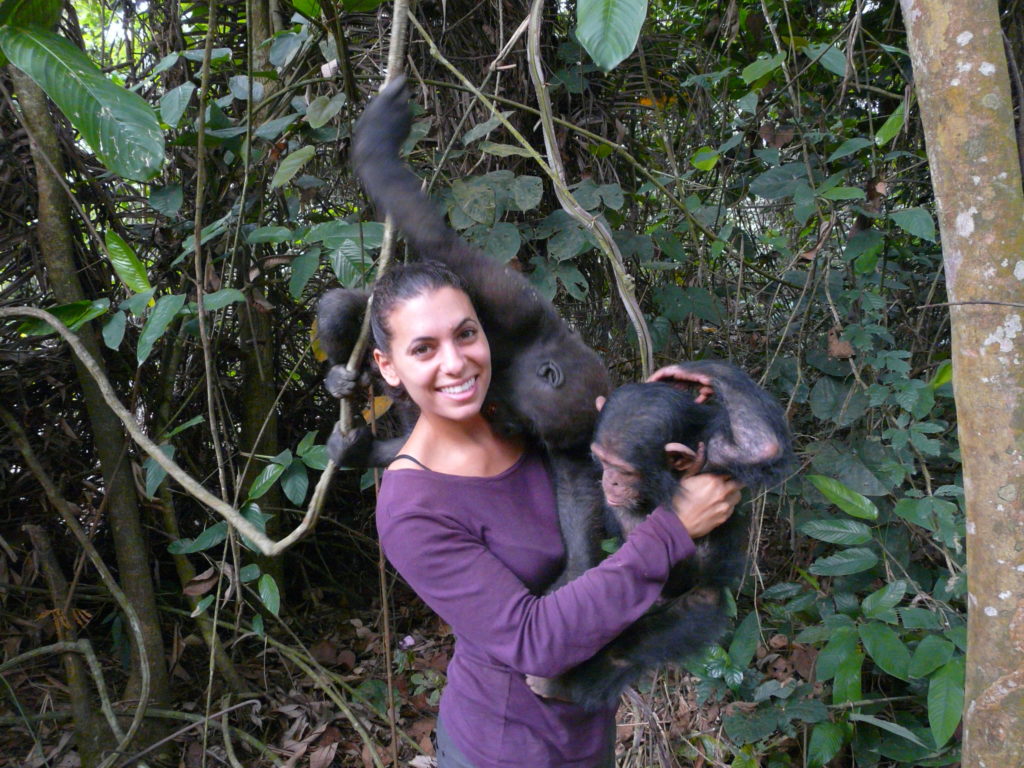
Chickaboo (left) Mac (right) and I
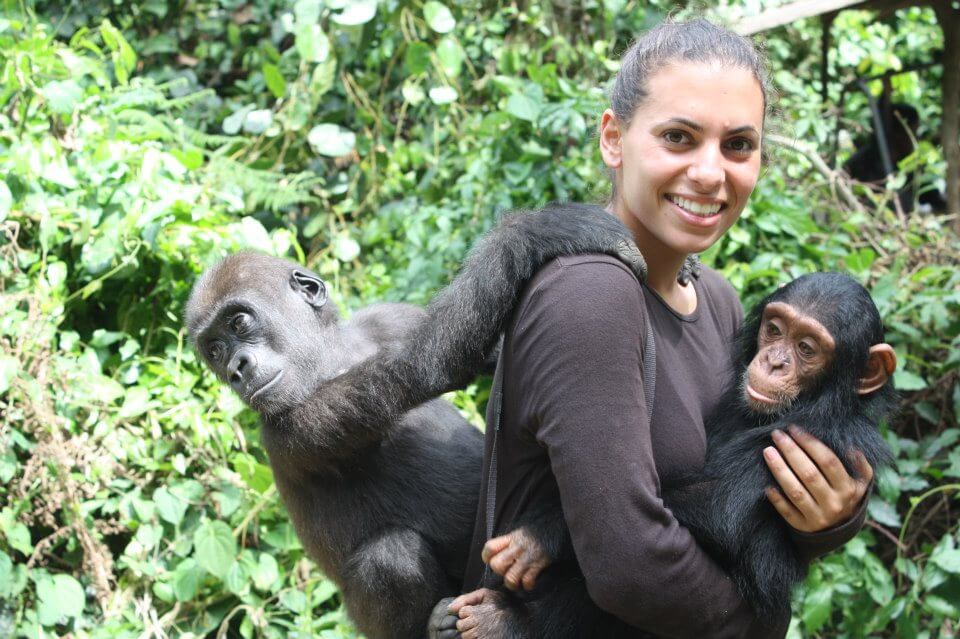
Chickaboo (left) Mbia (right) and I
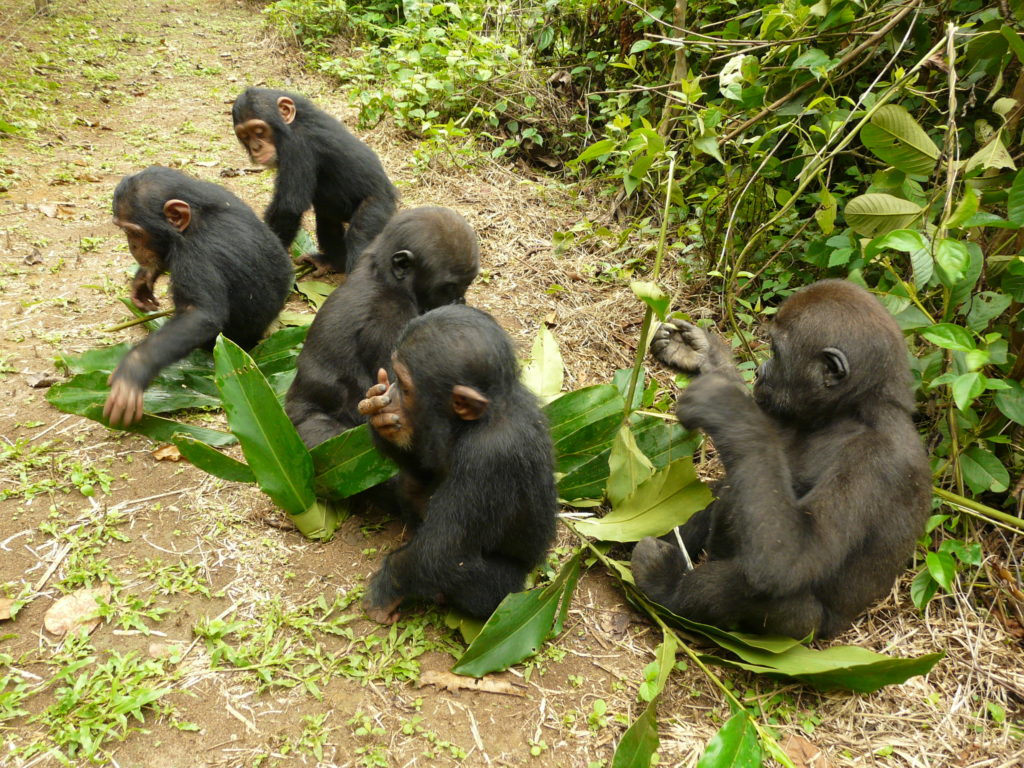
From top – Mbia, Mac, Luci, Ayisha and Chickaboo
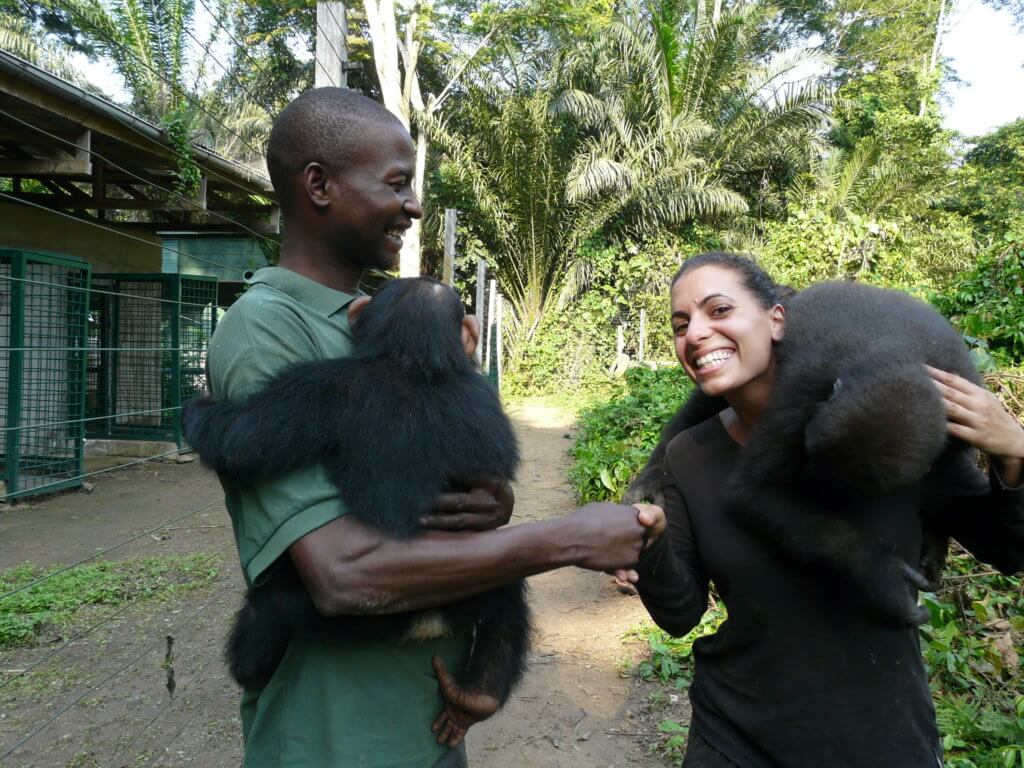
Sanda (Carer) with Mac and Myself with Chickaboo
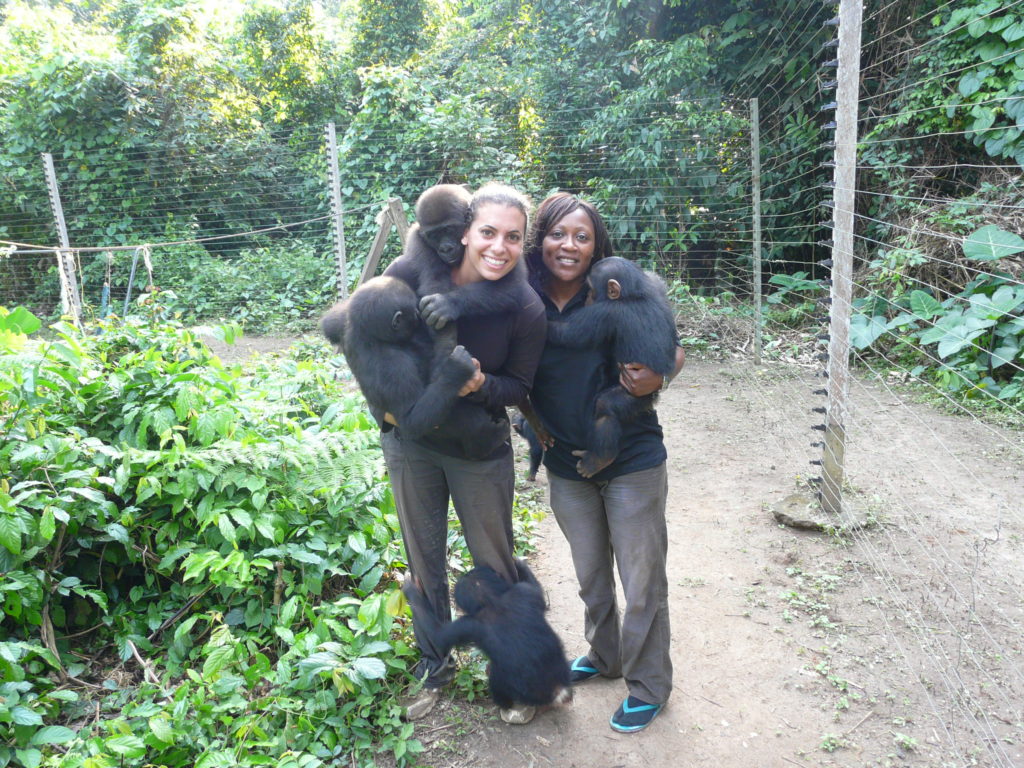
Myself, Chickaboo (behind), Luci (left), Ayisha (below) and Kristie (chimpanzee carer) with Mac.
Chickaboo
She arrived at AAA in a shocked and withdrawn state. She suffered from a deep, painful wound on her wrist, inflicted by a hunter’s snare. For some time she was unable to move her hand or fingers or even walk properly. Thankfully enough funds were raised to allow her to receive the specialist surgery she needed to repair her tendons and broken bones. After recovery she was placed in care with Luci, to help support each other.
Chickaboo grew into a confident, curious, strong and determined gorilla. She was very inquisitive and always wanted to play. 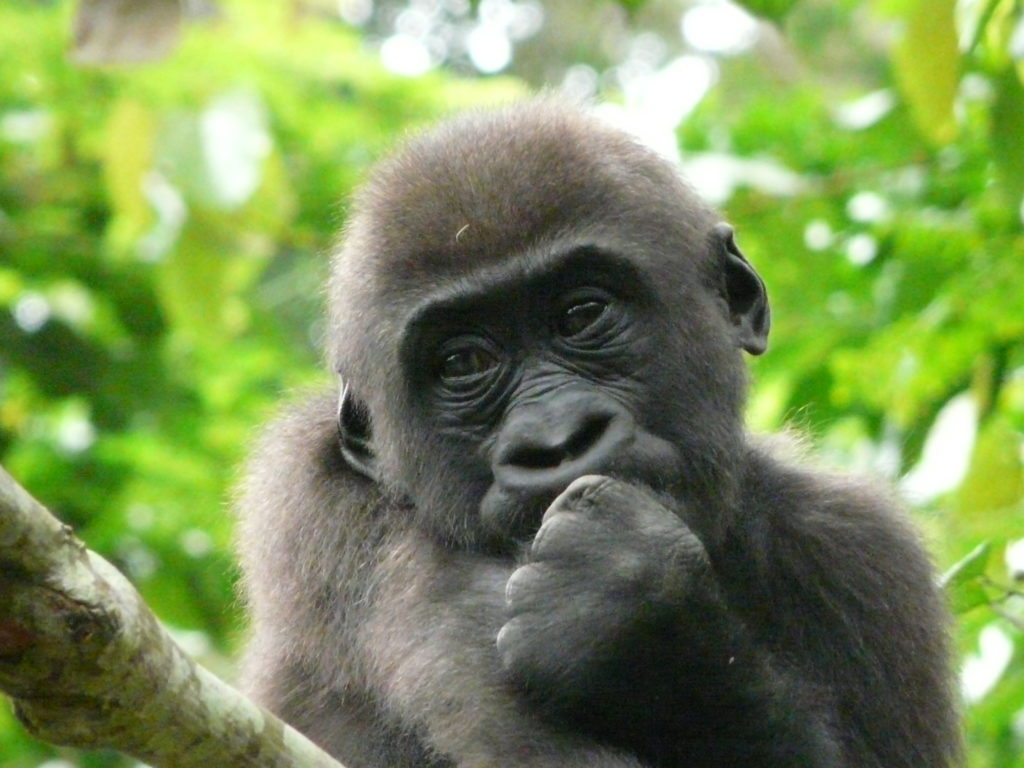
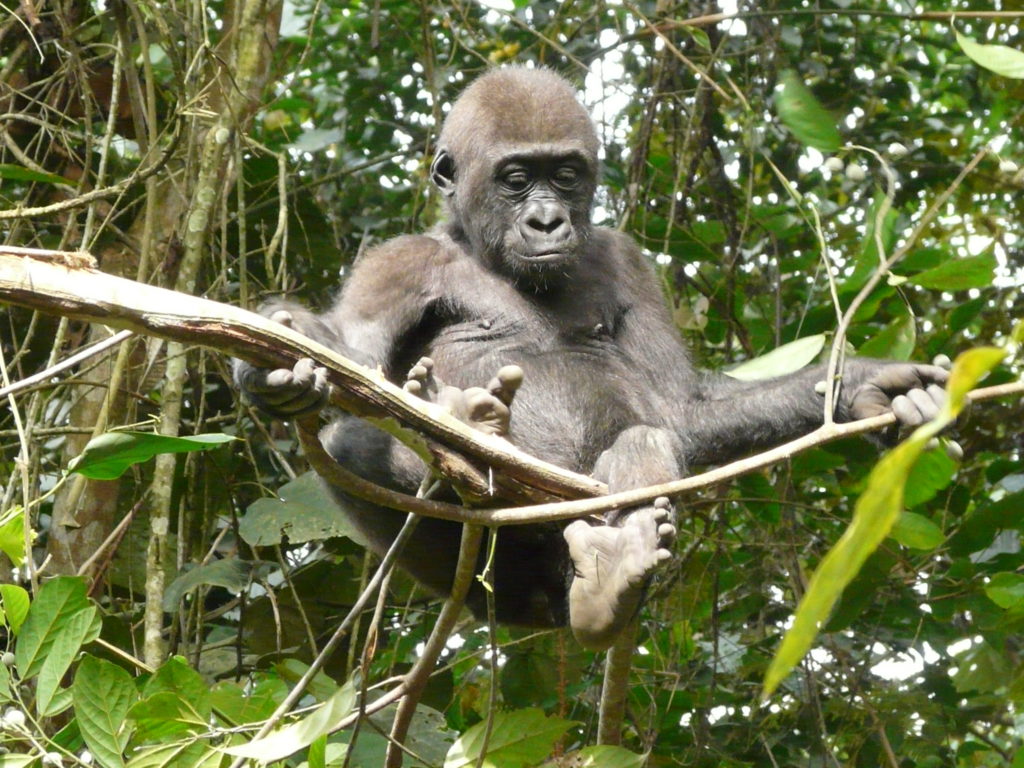
Chickaboo building a nest from instinct, just as her family would have done in the wild.
Luci
She was found in a logging concession after her family was killed by hunters. Like most gorillas who have lost their mothers, Luci was depressed and frightened. After arriving at AAA she adapted better than anyone expected, showing strength rarely seen in such a young orphaned gorilla.
When I met Luci, she was very shy and very bonded to her carer. Over time she continued to gain strength and confidence and even warmed up to me, initiating contact. Her trust in me to feel comfortable without her carer around was truly heartwarming.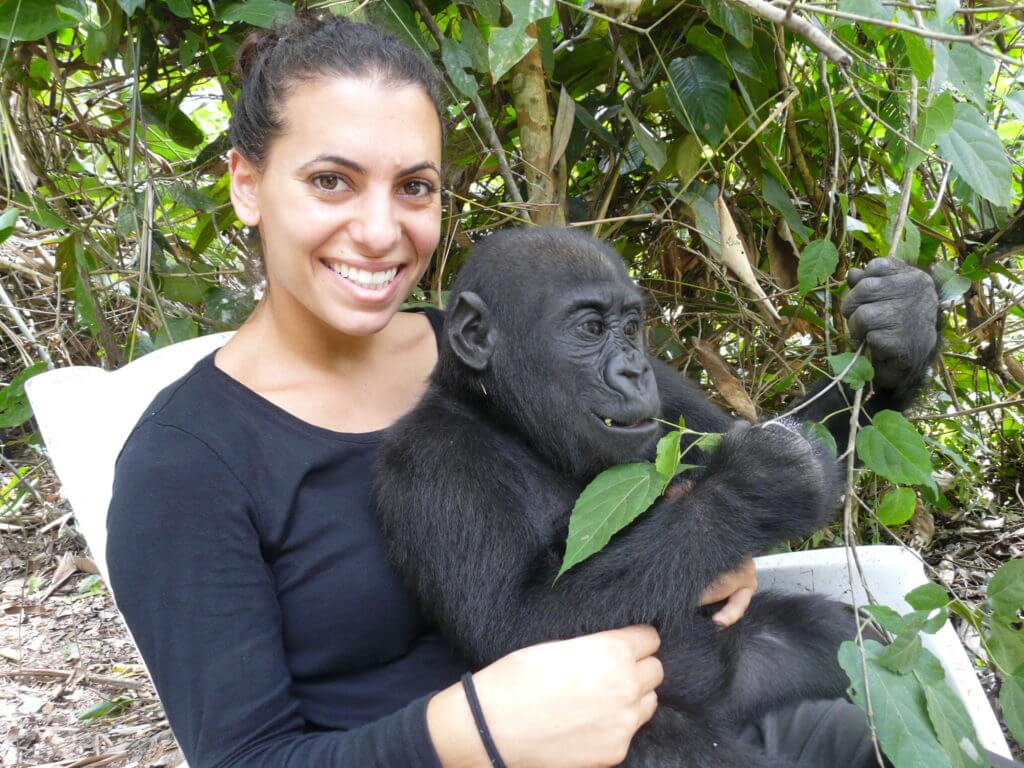
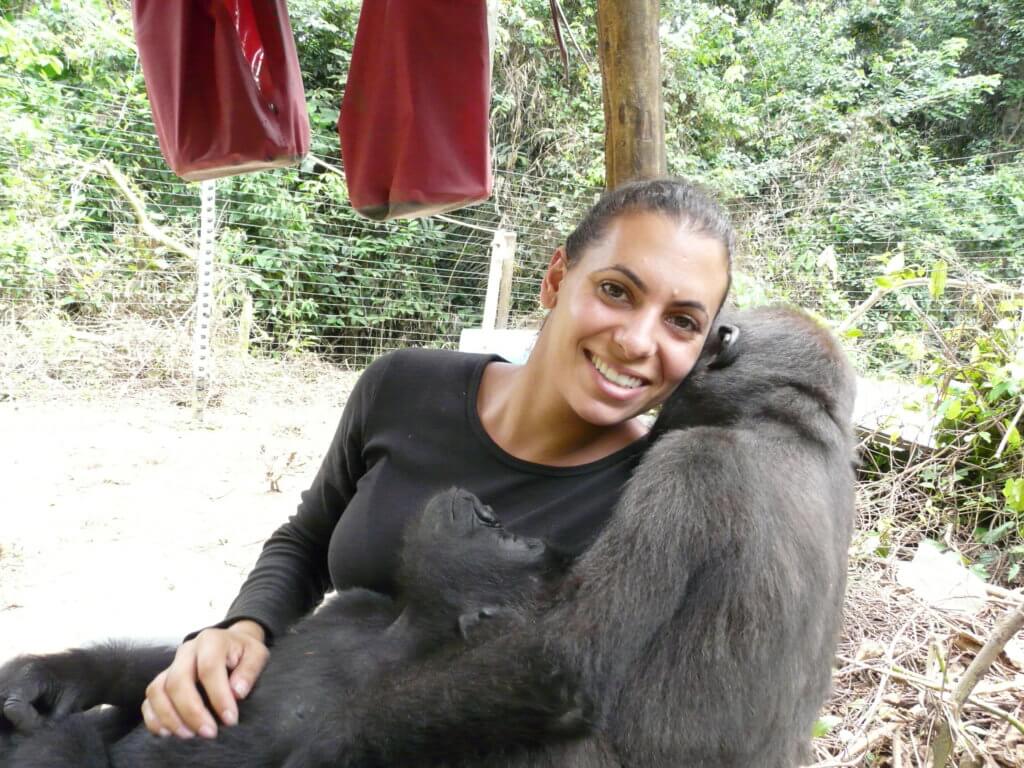
Luci (left) Chickaboo (right) and I
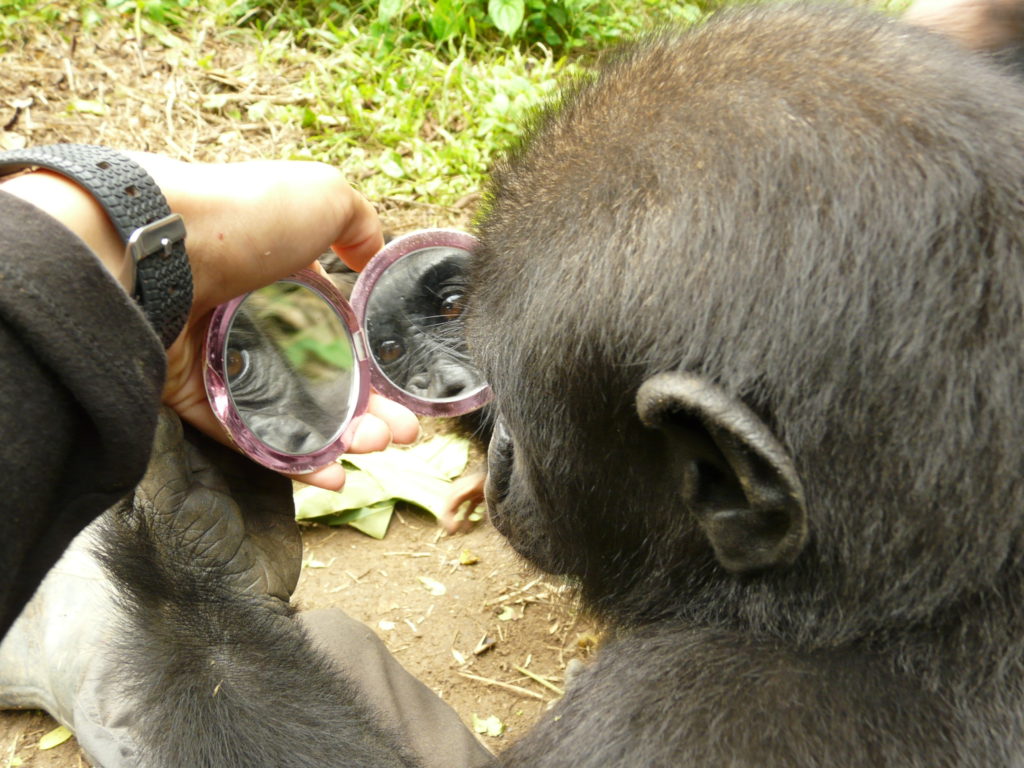
Luci recognising and looking at herself in my mirror
It was so interesting being surrounded by these animals, watching them and seeing the immense similarity they had with human infants. They would test you just like a human toddler would, seeing what they could get away with, the only difference was, they could run up a tree knowing we couldn’t catch them.
If they fought with each other, they would run to us for support, if they wanted to venture further, they would pull us to come with them. They absolutely loved being groomed, which is where the real bonding between us occurred.
The laughter of chimps and gorillas being tickled is a sound I wish I could hear more often. It always put a smile on my face, hearing them enjoying themselves. Especially after all the trauma they had experienced prior to finding safety at AAA.
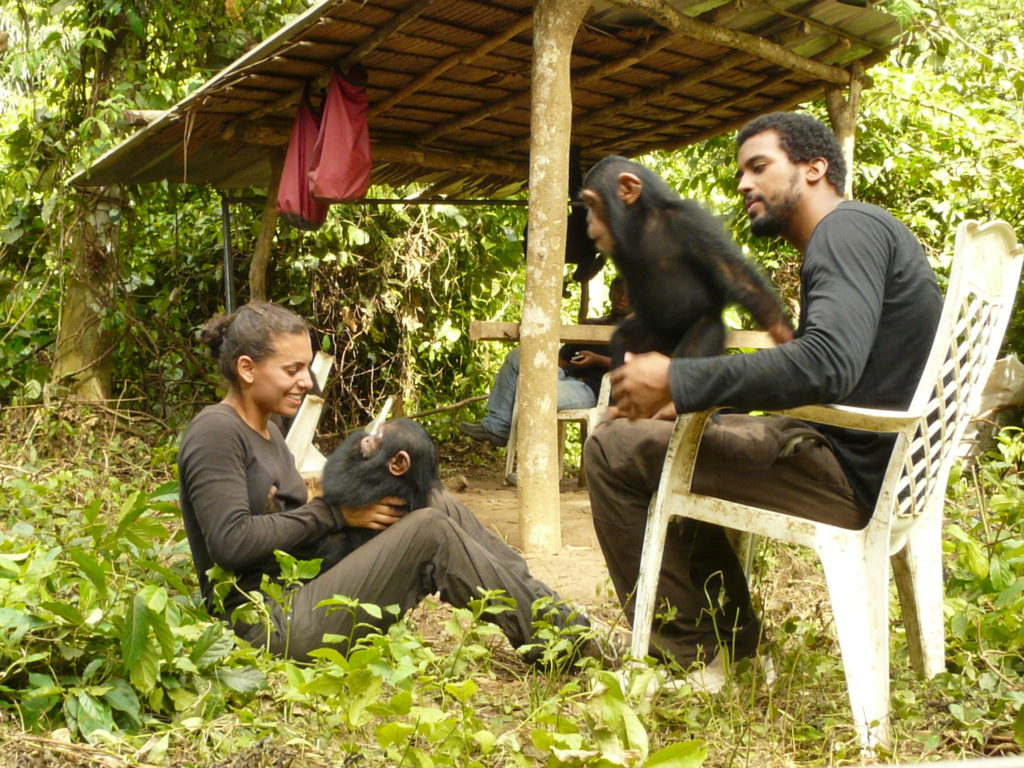
Raising these infants was a challenging experience, not only physically but mentally too. It’s not all fun and games. It often consisted of long nights, early mornings and it could get overwhelming at times, realising how much they relied on you every day. When they were sick, or when it rained, they needed more of your time and energy.
I grew immensely from this experience. I’m so thankful that I had this rare opportunity with the infants, that I was trusted enough to be a valuable support for these animals. They taught me so much and made me realise how important it is to be patient and to forgive.
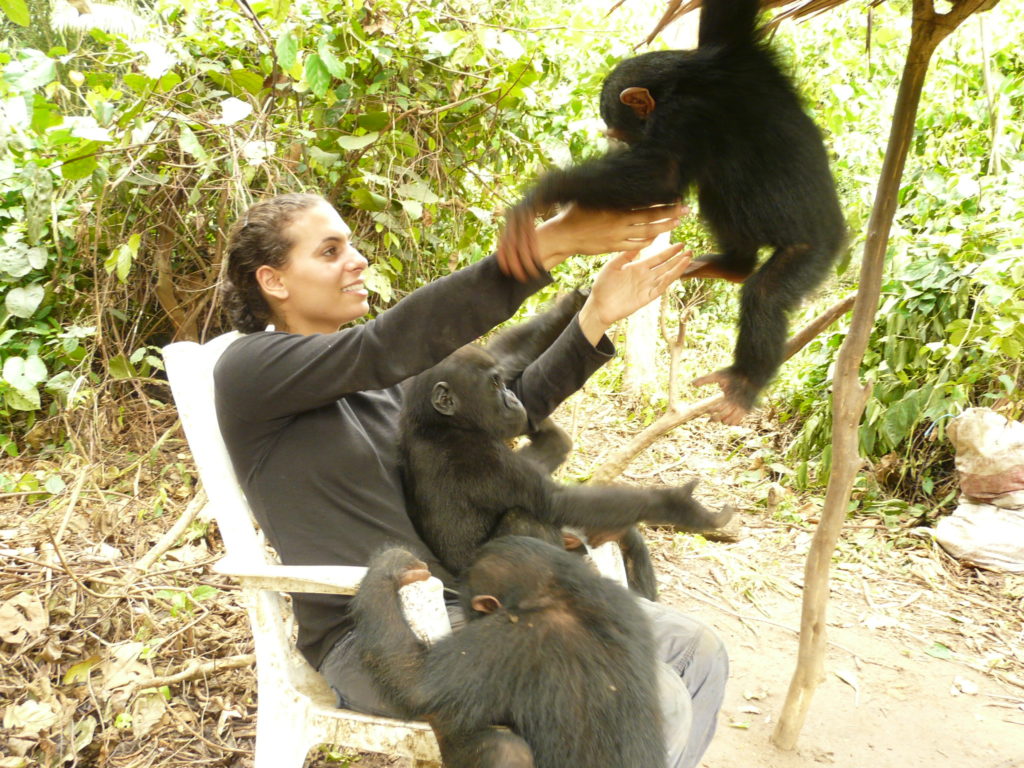
Other tasks
Three weeks before we left the sanctuary, I was involved in repainting a night enclosure. In preparation for the infants to be rehomed into it, which was linked to their new day enclosure.
It took the three of us two painstaking weeks to remove the old flaking paint, apply a layer of rustproofing paint and then two coats of fresh paint. It was back-breaking work but it gave the cage a new life and the ability to last several more years. Without the help from volunteers, the sanctuary staff would have struggled to have completed this task.
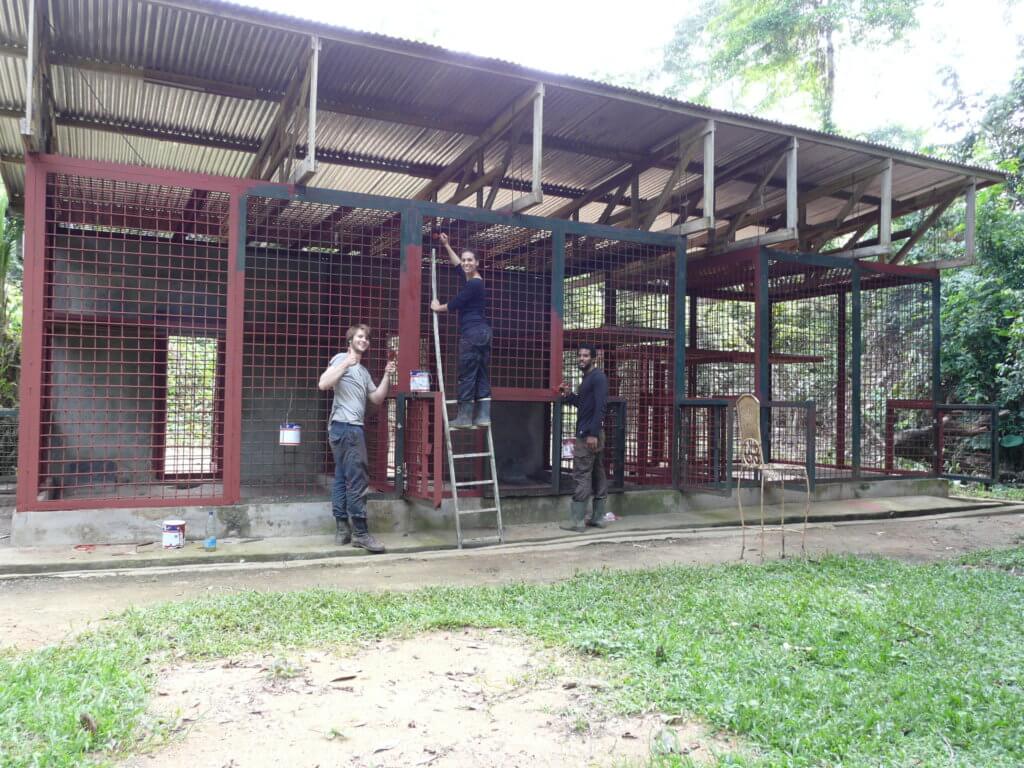
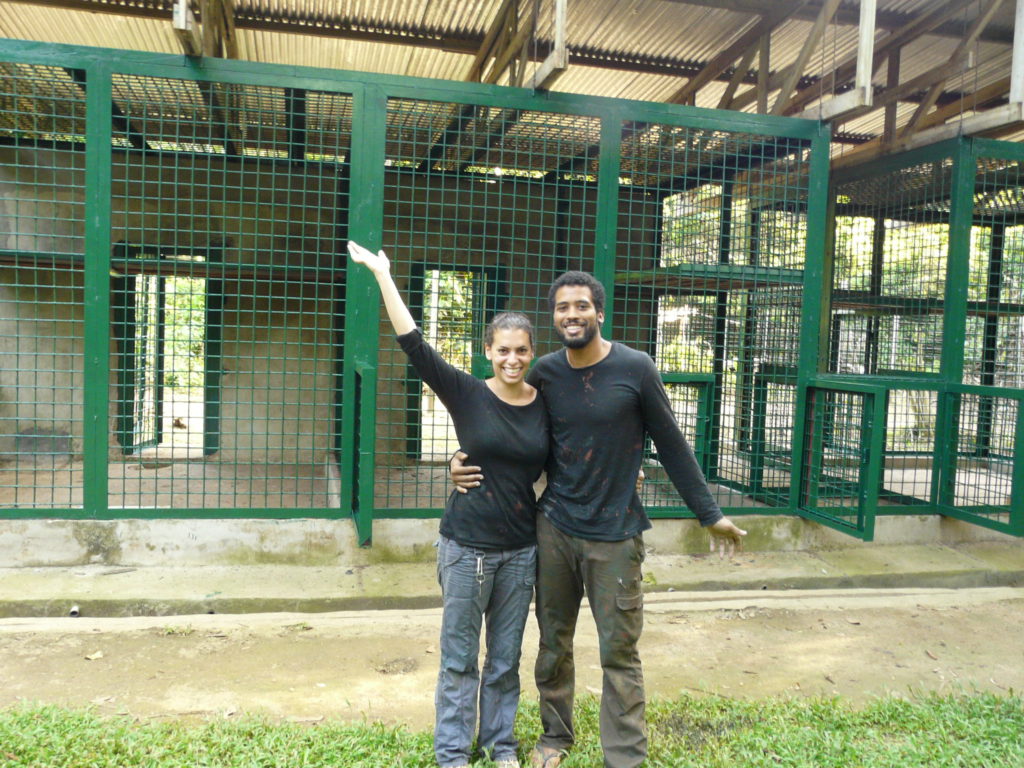
The week before we left the sanctuary, the infants began accustomising to these enclosures, learning to sleep without us and their carer. Having each other made it easier for them to adjust. It was still a heartbreaking experience hearing them cry out for us the first time we left them.
By the end of the week, they became accustomed to the new routine and were adapting extremely well. Supporting each other and becoming more independent and less reliant on us. This made it easier for me to finish my time at the sanctuary.
Now, 6 years on, these babies have grown big, strong and independent. Sadly, many other individuals have since arrived at AAA, joining these chimps and gorillas in their respective groups.
Bobo’s group
As well as working with the infants and juvenile chimps, we also had the rare opportunity to work with one of the established older gorilla groups, known as Bobo’s group. Which consisted of the Silverback, Bobo, two black backs, Kibu and Nkamum, three females; Jasmine, Geri and Avishag and her juvenile Eto-fils.
Normally, breeding within the sanctuary is not allowed and the females are given birth control. However, she outsmarted her carer pretending to swallow the pill until it was noticed that she was pregnant.
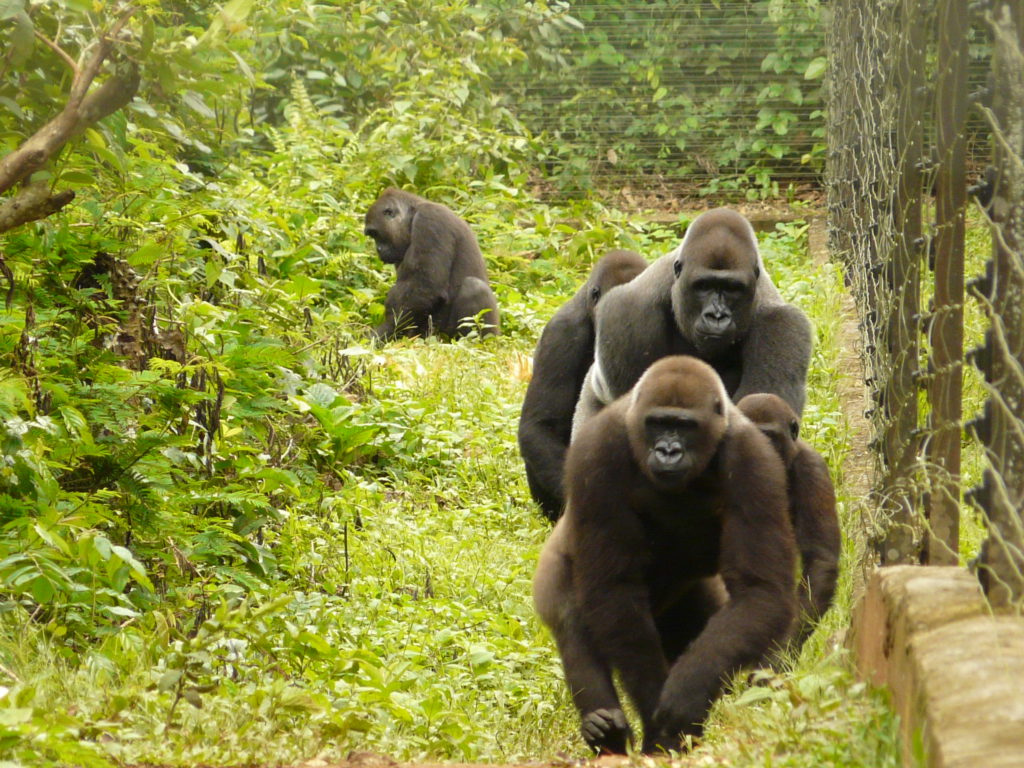
Geri, followed by Eto-fils, Bobo, Avishag, and Jasmine.
What a remarkable opportunity to witness these magnificent and regal animals so close. Being in their presence was extremely surreal. The first thing you notice, apart from their grand size, is their strong musty scent, which I absolutely loved.
We assisted in the cleaning of their night enclosure, food preparation, and observation. Definitely no physical contact with this group. Their carer spoke only French, so be sure to brush up on your French language skills to gain as much insight as possible.
We witnessed their intelligence when they would use a dry stick to lift the electrified wire to reach for fruits on the other side of their enclosure, avoiding an electric shock.
They were as interested and curious of us, as we were of them. Watching our moves, mimicking our gestures.
The enclosure was very big and dense with plenty of trees and foliage. If they didn’t want to be seen for the day, they could hide away, or climb up a tall tree.
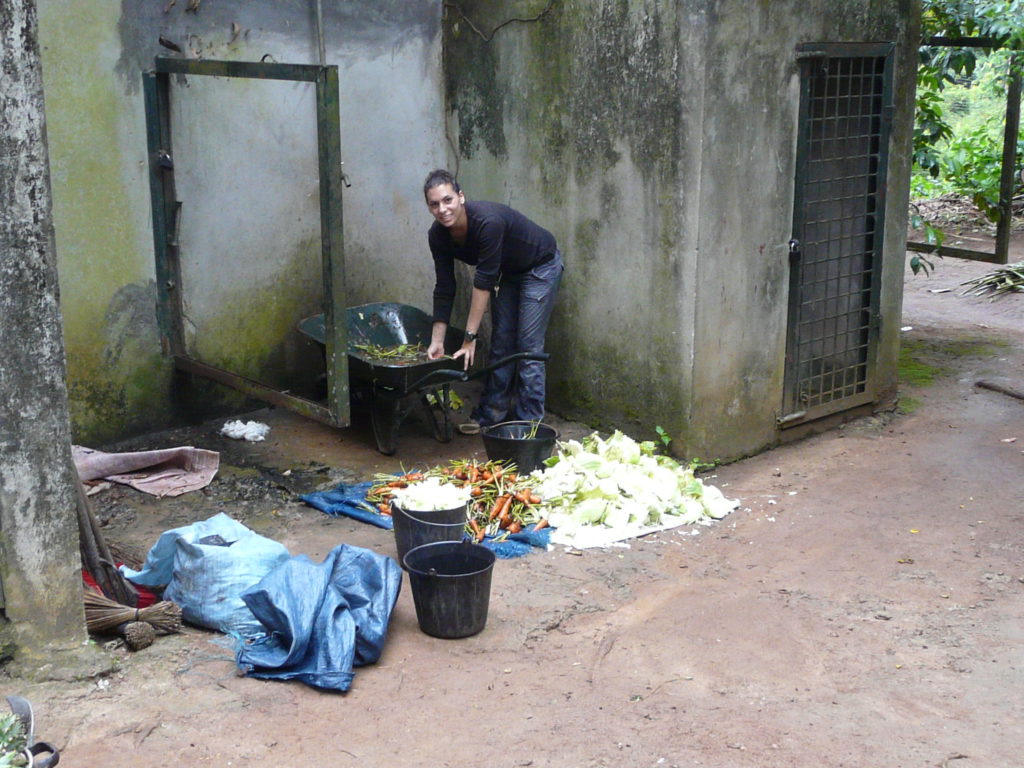
Washing and cutting their vegetables
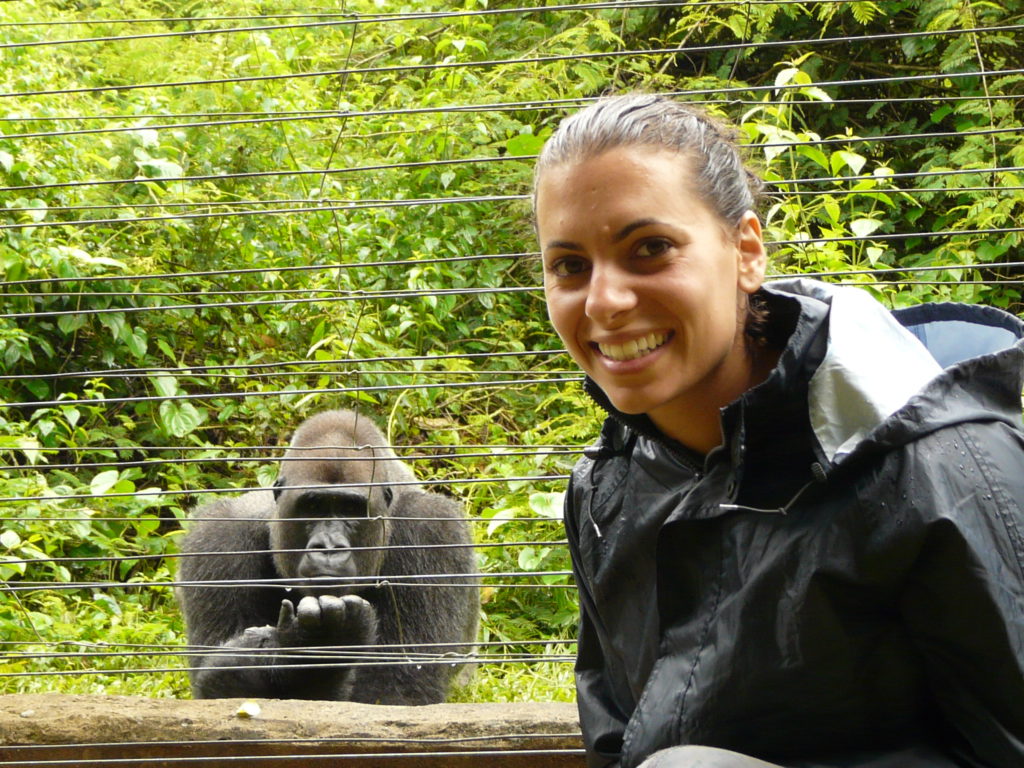
Bobo and I
Other Animals
The sanctuary also housed another gorilla group behind the volunteer sleeping quarters and several adult chimpanzee groups. Other animals also resided at the sanctuary, including mandrills, olive baboons, guenons, patas monkeys, de brazza’s monkeys, mangabeys and civets.
Several orphaned kittens and puppies also arrived during our time, who were bottle-fed round the clock by us and the other volunteers. All day, every day we were occupied caring for the many animals in need.
We only got the chance to leave the sanctuary three times in three months, the needs of the sanctuary always came first. During this time we were able to contact our friends and family and do some food shopping, always escorted by military, for our safety.
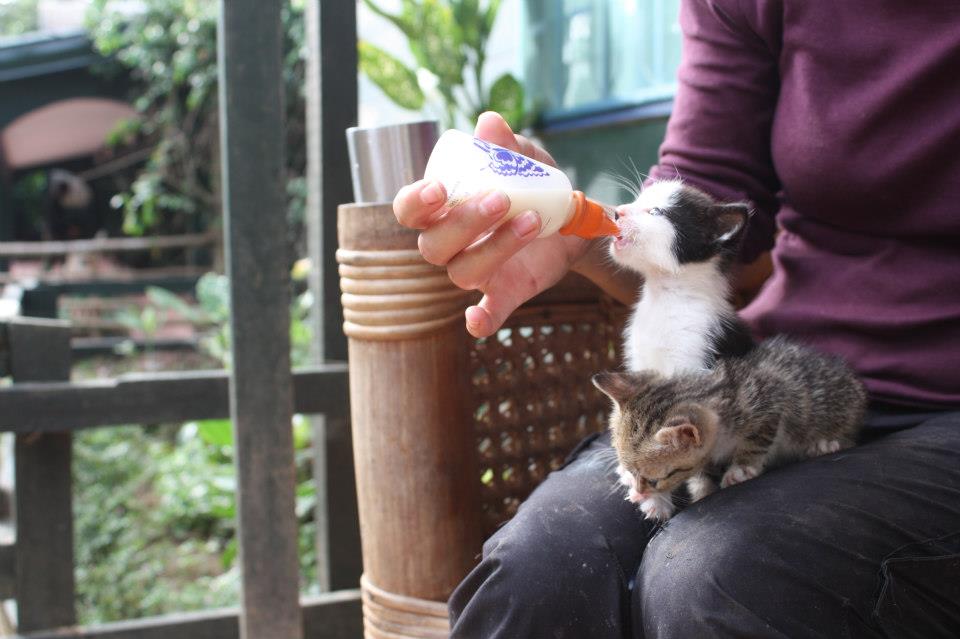
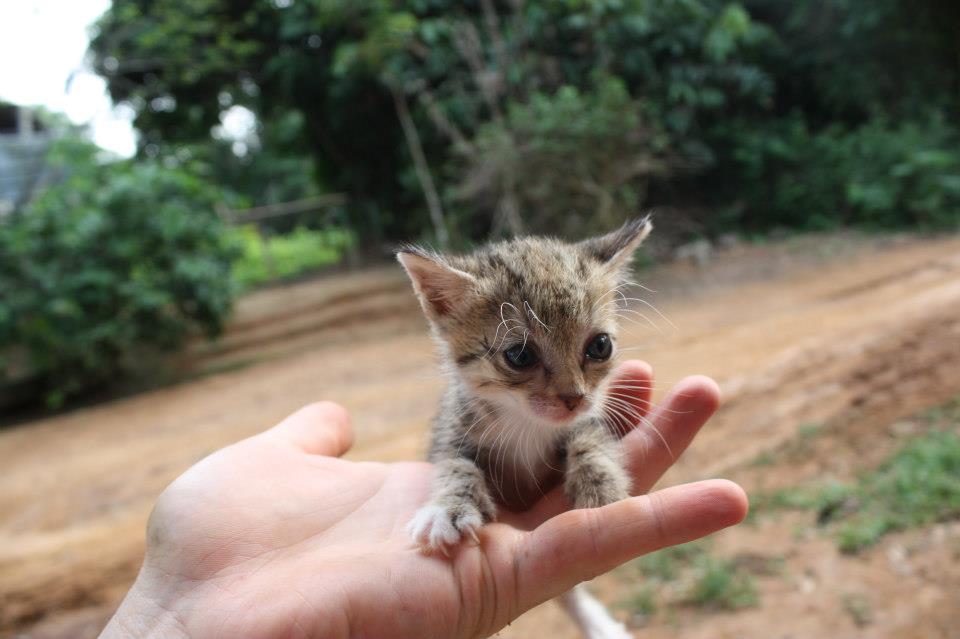
The months spent with all of these animals was incredibly eye-opening. The primates were in this situation due to mankind’s destructive logging of their habitat. Logging allows poachers to gain access to areas previously too dense and kill whole families for meat, known as bushmeat. The young infants are too small to be worth enough as meat and are transported alone and scared for onward sale as pets or tourist attractions.
These infants suffer not only from emotional trauma but also physical injuries from the bullets and snares used to kill their family. Sadly, for every rescued infant up to ten family members are slaughtered in the forest.
Rehabilitating these survivors takes an immense amount of time and dedication, sometimes with a sad outcome. Not to mention the funds necessary to ensure they receive the medical treatment needed, food, milk, safety, and the dedicated carers to raise them.
It is hard to comprehend how these orphans could be so forgiving of humans after what they have endured and encountered before arriving at the sanctuary. Their courage, determination, and forgiveness are truly remarkable to witness. Qualities we as humans should adopt.
AAA is always in need of caring, dedicated volunteers. Their volunteer fee may seem high at first, but they have a lot of mouths to feed and communities to educate. Be sure to read my tips on how to raise the funds necessary to volunteer with animals.
I really do hope you can find some time to give to AAA. I promise you, your experience won’t be the same as mine, but it will be rewarding, eye-opening, exhausting, emotional and immensely educational and life-changing.
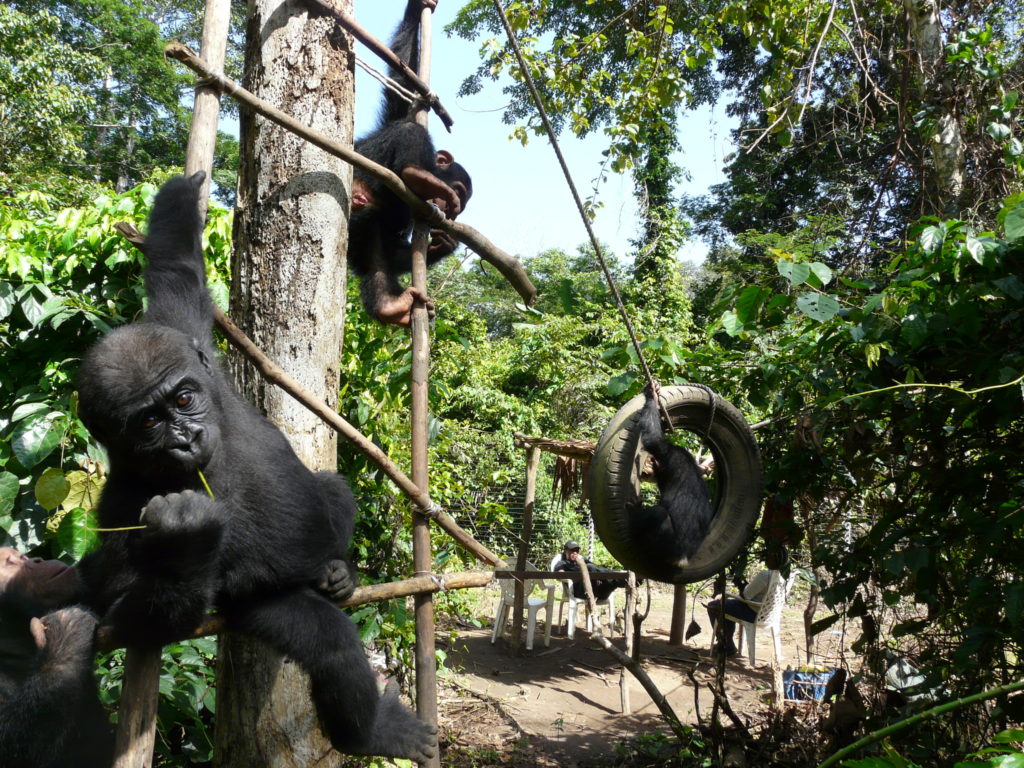
Thanks for reading!
Please leave a comment about anything you read, or if need any advice. I would love to hear from you.
You can join my community on Instagram and Facebook to keep up to date with what I’m up to around the world! xx
Leave a Reply